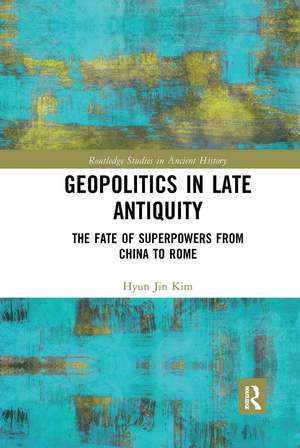Geopolitics in Late Antiquity: The Fate of Superpowers from China to Rome: Routledge Studies in Ancient History
Autor Hyun Jin Kimen Limba Engleză Paperback – 18 dec 2020
A unique feature of this book is its in-depth analysis of the geostrategies (some successful, others misguided) adopted by China, Rome and Persia to cope with the growing Inner Asian threat. The conclusions and insights drawn from this analysis are then used to inform modern geopolitics, mainly the contest for hegemonic power between the United States and China.
Geopolitics in Late Antiquity is a crucial resource for both academic and learned general readership, who have an interest in the fate of antiquity’s superpowers and also for those engaged in current international relations policy-making, who wish to learn from historical precedents.
Din seria Routledge Studies in Ancient History
- 8%
 Preț: 389.60 lei
Preț: 389.60 lei -
 Preț: 489.26 lei
Preț: 489.26 lei - 16%
 Preț: 261.73 lei
Preț: 261.73 lei -
 Preț: 425.59 lei
Preț: 425.59 lei -
 Preț: 481.05 lei
Preț: 481.05 lei - 26%
 Preț: 821.29 lei
Preț: 821.29 lei -
 Preț: 469.34 lei
Preț: 469.34 lei -
 Preț: 389.66 lei
Preț: 389.66 lei -
 Preț: 485.46 lei
Preț: 485.46 lei -
 Preț: 389.66 lei
Preț: 389.66 lei -
 Preț: 389.66 lei
Preț: 389.66 lei -
 Preț: 389.66 lei
Preț: 389.66 lei -
 Preț: 389.38 lei
Preț: 389.38 lei -
 Preț: 381.00 lei
Preț: 381.00 lei - 17%
 Preț: 258.50 lei
Preț: 258.50 lei -
 Preț: 389.66 lei
Preț: 389.66 lei -
 Preț: 389.66 lei
Preț: 389.66 lei - 16%
 Preț: 263.15 lei
Preț: 263.15 lei - 18%
 Preț: 1002.50 lei
Preț: 1002.50 lei -
 Preț: 324.17 lei
Preț: 324.17 lei
Preț: 378.92 lei
Nou
Puncte Express: 568
Preț estimativ în valută:
72.51€ • 75.89$ • 60.35£
72.51€ • 75.89$ • 60.35£
Carte tipărită la comandă
Livrare economică 31 martie-14 aprilie
Preluare comenzi: 021 569.72.76
Specificații
ISBN-13: 9780367733261
ISBN-10: 0367733269
Pagini: 136
Dimensiuni: 156 x 234 x 13 mm
Greutate: 0.2 kg
Ediția:1
Editura: Taylor & Francis
Colecția Routledge
Seria Routledge Studies in Ancient History
Locul publicării:Oxford, United Kingdom
ISBN-10: 0367733269
Pagini: 136
Dimensiuni: 156 x 234 x 13 mm
Greutate: 0.2 kg
Ediția:1
Editura: Taylor & Francis
Colecția Routledge
Seria Routledge Studies in Ancient History
Locul publicării:Oxford, United Kingdom
Cuprins
Acknowledgements; 1 Introduction; 1.1 The great geopolitical dilemma, theoretical approaches; 1.2 Territorial disputes and retrenchment, the re-emergence of policymaking; 1.3 Summary; 2 The geopolitical situation: the superpowers and the Huns; 2.1 Han China and the Huns; 2.2. Rome and the Huns; 2.3 Sassanian Persia and the Huns; 3 The superpower reaction; 3.1 China strikes back; 3.2 Rome falters; 3.3 Persian collapse; 4 Conclusion: the geostrategic choices for the future; 4.1 China as the geopolitical equivalent of the great Turco-Mongol Empires of Eurasia; 4.2 The geostrategic options for the US; Select bibliography; Index
Notă biografică
Hyun Jin Kim is Senior Lecturer in Classics at the University of Melbourne, Australia. He took his DPhil from the University of Oxford, UK, and is the author of multiple books on Greece-Rome and China comparative studies, the Huns and Inner Asia and the historical implications of China’s contemporary rise.
Recenzii
'Hyun Jin Kim is a true global historian. Able to exploit Chinese and classical sources directly, he has transformed our understanding of steppe history in Late Antiquity. The challenge posed by the Huns (Xiongnu for the Chinese) to the established great powers was serious. After surveying the varied responses of the Han empire, the two halves of the Roman empire, and the Sassanian Persian empire, and their varied outcomes, he offers sound advice to contemporary policy-makers in China and the USA.'
- James Howard-Johnston, Oxford University, UK
Descriere
Geopolitics in Late Antiquity explores the geopolitical revolution which shook the foundations of the ancient world, the dawning of the millennium of Inner Asian dominance and virtual monopoly of world power (with interludes) that began with the rise of the Huns and then continued under the hegemony of various other steppe peoples.
